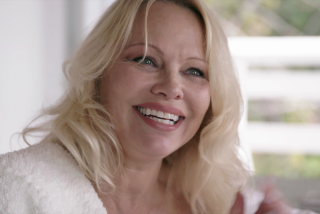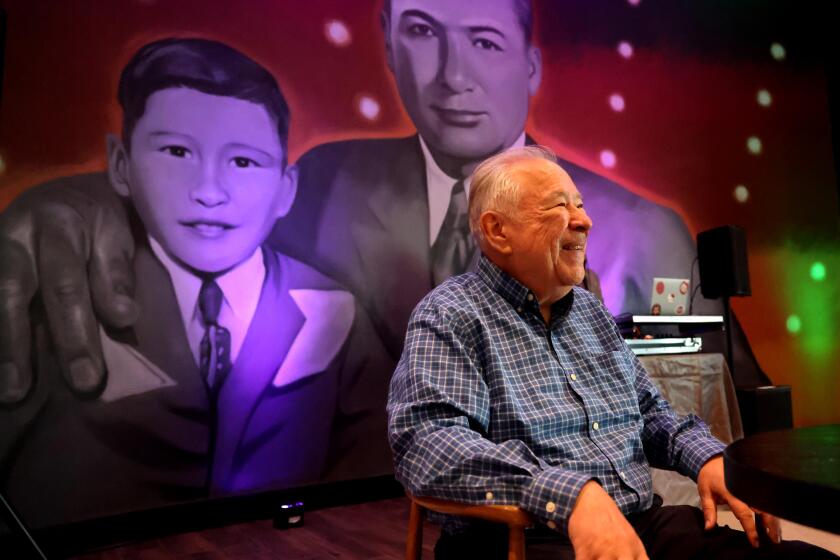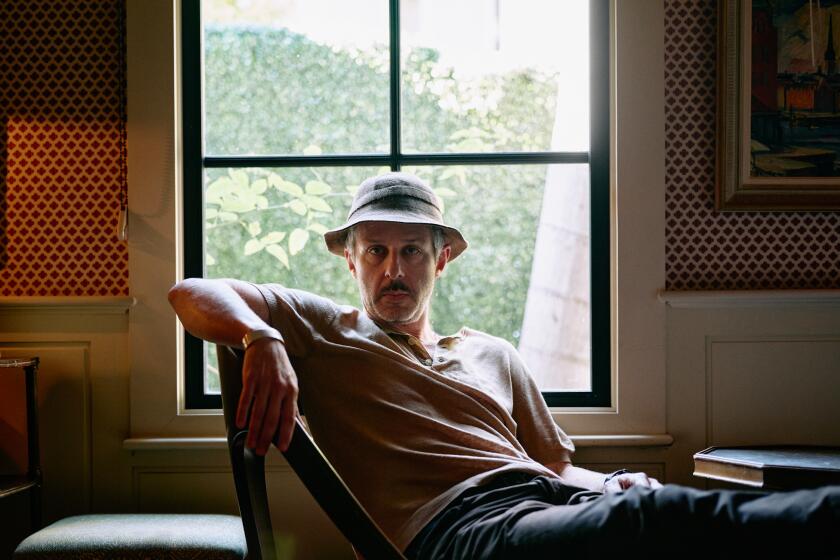Review: Judi Dench rules (again) in the lopsided crowdpleaser ‘Victoria & Abdul’
The English director Stephen Frears has an affinity for odd-couple comedies, particularly whenever Judi Dench gets involved. Their prior collaborations include “Mrs. Henderson Presents” (2005), in which Dench played a wealthy widow enjoying a thorny rapport with a theater manager (Bob Hoskins), and “Philomena” (2013), which cast her as a devout Irish Catholic woman searching for her long-lost son in the unlikely company of a cynical journalist (Steve Coogan).
That neither title bothers to acknowledge the male companion’s name tells you something, however unwittingly, about how effortlessly Dench dominates the screen, to the point where her co-stars sometimes seem like talented afterthoughts. If nothing else, then, the title of “Victoria & Abdul,” Frears’ blandly sumptuous new crowd-pleaser, would seem to promise a more equitable pairing than usual. But that promise is swiftly obliterated in the course of what turns out to be a very special episode of “The Judi Dench Show,” centered on the spectacle of our most regal living actress revisiting one of her most celebrated roles.
As art-house devotees may remember, Dench first played Queen Victoria two decades ago in John Madden’s “Mrs. Brown,” which earned her the first of seven Academy Award nominations. She is doubtless being positioned for an eighth with “Victoria & Abdul,” an unofficial “Mrs. Brown” sequel that at times plays like a remake: another tale of Victoria the withdrawn widow raising eyebrows by bringing an outsider into the royal fold.
Adapted by Lee Hall (“Billy Elliot,” “War Horse”) from a book by Shrabani Basu, Frears’ film dramatizes a heretofore little-known episode from Victoria’s later years, when she formed a platonic but intimate relationship with Abdul Karim, an Indian Muslim clerk whom she had employed as her personal servant. The movie begins in 1887, the year of the queen’s Golden Jubilee — an occasion that summons the handsome, high-spirited 24-year-old Abdul (Indian actor Ali Fazal) and his grumpy friend Mohammed (Adeel Akhtar, “The Big Sick”) from their home in Agra, India, to England, where they are to deliver a ceremonial gold coin to Her Majesty.
Cut to a celebratory lunch at Windsor Castle, where Dench gets an entrance worthy of, well, a queen. Her Victoria sits at the head of a very long table and, looking too weary and cantankerous to even bother making conversation, proceeds to voraciously devour one course after another while her guests try to keep up. Into this world of soulless festivity and pompous protocol comes the meek Abdul, towering and resplendent in uniform; after performing his duties, he enjoys a fleeting, forbidden moment of eye contact with Victoria, their gazes meeting over her dessert plate.
“Terribly handsome” is Victoria’s assessment of the young man’s charms, and that’s enough to extend Abdul’s stay, during which he and the queen cement their friendship over private conversations about India — a country she holds dominion over as empress, but which she has never once set foot in. Abdul delights her with stories about the delicious taste of mango or the beauty of the Taj Mahal, and before long she has promoted him to the position of munshi, or scholar, tasked with giving her lessons in Urdu and the Koran.
For all the anti-colonialist sentiments expressed in [the film] those criticisms are ultimately subsumed in a warm, troubling glow of British Empire nostalgia.
Abdul may be a foreign-born commoner, but he also represents the opposite of everyone Victoria hates — namely, the scheming sycophants in her court, who are scandalized by the presence of an Indian man ascending to a position of trust and power that eludes them all. There are a lot of racist, villainous fish to fry here, none more deserving than Victoria’s son, Edward VII, a.k.a. Bertie (an excellent Eddie Izzard), although the prime minister (Michael Gambon) and the imperious Lady Churchill (Olivia Williams) run a close second.
For a while you hope that Frears might display some of the ruthless but compassionate wit of “The Queen,” his marvelously penetrating 2006 drama about how the English monarchy weathered a much more recent public-relations crisis. But the scalpel-like precision with which that film filleted its subjects ultimately eludes this one, which never locates a meaningful point of view on its particular chapter of history.
For all the anti-colonialist sentiments expressed in “Victoria & Abdul” — most bluntly by Mohammed, who is treated as grumbling comic relief one minute and milked for conveniently timed tragedy the next — those criticisms are ultimately subsumed in a warm, troubling glow of British Empire nostalgia. Danny Cohen’s camera leans in to observe the characters as they cajole, plot and argue, but more often than not it is enthralled — you might even say distracted — by the logistics of last-minute banquet preparations, the ritualized spectacle of servants lining up in perfect formations and, above all, the rich colors and elaborate details of Consolata Boyle’s costumes.
What sounds to some audiences like damnation will, of course, strike others as a recommendation. Like most literate, lavish period pieces of its type, “Victoria & Abdul” is not without its surface pleasures, among them the chance to see Osborne House, Victoria’s holiday retreat on the Isle of Wight, where Frears and his crew were allowed to film. And while Dench’s performance may break no new ground, she flawlessly embodies the fierce, often contradictory impulses — the openness to late-in-life experience, the girlish, coquettish delight in Abdul’s presence, the steely, stubborn defiance of almost everyone else — that made Victoria such a singular and formidable presence.
But the richness of Dench’s characterization only underscores the drama’s fundamental imbalance. As Abdul, Fazal projects an effortless air of decency and compassion, even when less-flattering aspects of the character’s background are brought to light by his rivals. But it’s insulting that we never get a sense of Abdul’s deeper motivations, the desires that lurk beneath his smiling, unquestioning devotion to his benefactress. He stands tall and erect in the background of scene after scene, remaining silently in his place while Victoria defends him against the arrogant bigots in their midst.
That inaction may have suited the custom of the time, but it also leaves “Victoria & Abdul” feeling less like a critique of English colonialism than a relic of it — a movie that refuses to practice the enlightenment it preaches. Queen Victoria may well have been genuinely interested in Indian life in general, and the life of the Indian man she befriended in particular. But this genteel, self-satisfied movie doesn’t begin to share her curiosity, much less earn yours.
------------
‘Victoria & Abdul’
Rating: PG-13, for some thematic elements and language
Running time: 1 hour, 52 minutes
Playing: ArcLight Cinemas, Hollywood, and the Landmark, West Los Angeles
See the most-read stories in Entertainment this hour »
Movie Trailers
More to Read
Only good movies
Get the Indie Focus newsletter, Mark Olsen's weekly guide to the world of cinema.
You may occasionally receive promotional content from the Los Angeles Times.











